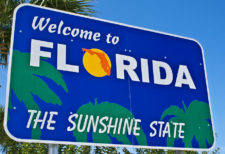 Good news: By March 1, 2021, bills had been introduced in 20 states that would have moved all public notice, or a significant percentage of it, from newspapers to government websites. A year later we’ve seen similar legislation in only six states.
Good news: By March 1, 2021, bills had been introduced in 20 states that would have moved all public notice, or a significant percentage of it, from newspapers to government websites. A year later we’ve seen similar legislation in only six states.
Bad news: The bill in one of those states — Florida House Bill 7049 — is a serious threat to become law. HB-7049 passed out of committee last Monday and is expected to be approved by the full House sometime this week.
So the battle over public notice in Florida comes down to the Senate, as it has in the past.
HB-7049 would completely undo the historic public notice bill passed last year by the same legislature, which just took effect on Jan. 1. That statute was the first public notice law to allow newspaper websites to begin serving as an alternative to print newspapers. It also expanded the definition of an official newspaper, allowing free-distribution papers to qualify to publish notices in print or online.
The new bill would authorize local government agencies to publish notices on their county’s website or on another, private website designated by the county. Agencies in smaller counties with population under 160,000 would first be required to hold a public hearing to determine its residents have sufficient access to broadband internet before deciding to make the move to their county website.
HB-7049 also eliminates the expanded definition of an official newspaper approved in last year’s bill. It is silent on the question of whether counties are required to offer the website option to government agencies or whether they can charge them a publication fee.
Proponents of the legislation have given little consideration to the details involved in its implementation, a source familiar with the issues told us.
Three other significant and unique public notice bills come to us from the overwhelmingly blue state of Rhode Island. All of them are scheduled for committee hearings this week, including two competing but similar bills, H-7311 and H-7312, that would replace current laws requiring newspaper notice by moving some notices to government websites and keeping others in local newspapers.
H-7311 is sponsored by a Democrat and purports to “modernize the publication of legal notices and advertisements within the state.” It would require all notices in the state to be published on the secretary of state’s website and various other government websites. But it would also maintain newspaper notice for private-party, probate and municipal and local public hearing notices, while eliminating newspapers from the equation for all state government notices. It also stipulates that the newspaper notices it still be requires must be published in local weekly newspapers.
H-7312 is co-sponsored by three Republicans. Like H-7311, it would move state government notices to the secretary of state’s website and another government website, while keeping private-party notices in newspapers — weekly or otherwise. But unlike the Democrat-sponsored bill, H-7312 would authorize municipalities to post or publish all of their notices in “a newspaper or on any other platform designated by city or town ordinance.”
Both bills are scheduled to be heard on Thursday in the House Judiciary Committee.
H-7203, which is sponsored by two of the three Republicans who are also backing H-7312, is an especially odd piece of legislation. It would allow the towns of Burrillville (pop. 16,158) and Glocester (pop. 9,974) to publish notices on any “designated platform” in lieu of a local newspaper if the platform “may be reasonably demonstrated to reach a larger portion of the population within each such municipality” than any newspaper circulating in each town. It is scheduled to be heard tomorrow in the House Municipal Government & Housing Committee.
Democrats hold 65 of the 75 seats in Rhode Island’s House and 33 of the 38 seats in its Senate.
Outside of Florida and Rhode Island, the public notice scene in the rest of the country is generally quiescent. A bill in Arizona that would have allowed municipalities to post notices on their own websites was amended to limit its reach to Maricopa County. Now even that neutered version of the bill is stalled in the House. And bills in Kentucky and West Virginia that would move a significant portion of public notice out of newspapers — a perennial concern in both states — have no momentum with little time left in their legislative sessions.
